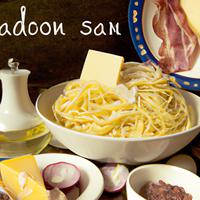
1 serving (300 grams) contains 574 calories, 28.0 grams of protein, 25.0 grams of fat, and 58.0 grams of carbohydrates.

Log this food in SnapCalorie

Nutrition Information
Calories |
452.0 | ||
|---|---|---|---|
% Daily Value* |
|||
| Total Fat | 19.7 g | 25% | |
| Saturated Fat | 7.9 g | 39% | |
| Polyunsaturated Fat | 0 g | ||
| Cholesterol | 157.5 mg | 52% | |
| Sodium | 629.9 mg | 27% | |
| Total Carbohydrates | 45.7 g | 16% | |
| Dietary Fiber | 2.4 g | 8% | |
| Sugars | 2.4 g | ||
| protein | 22.0 g | 44% | |
| Vitamin D | 31.5 mcg | 157% | |
| Calcium | 118.1 mg | 9% | |
| Iron | 2.0 mg | 11% | |
| Potassium | 236.2 mg | 5% | |
* Percent Daily Values are based on a 2,000 calorie diet. Your daily values may be higher or lower depending on your calorie needs.
Food Attributes
Source of Calories
About Traditional carbonara
Traditional Carbonara is a classic Italian dish rooted in Roman cuisine, celebrated for its simplicity and rich flavors. It features spaghetti or another type of pasta, tossed with a creamy sauce made from eggs, Pecorino Romano cheese, guanciale (cured pork cheek), and black pepper. Unlike modern variations, authentic carbonara contains no cream—the velvety texture comes from the emulsion created by the eggs and cheese. While Carbonara is high in protein and calcium, thanks to the eggs and cheese, it can also be calorie-dense and rich in saturated fats due to the guanciale and dairy. The dish provides an indulgent energy boost, ideal for physically demanding days, but moderation is key for those mindful of fat and sodium intake. Its origins in simple, rural Italian cooking make it both a cultural staple and a comfort food classic enjoyed worldwide.



